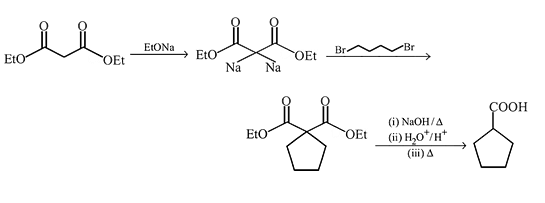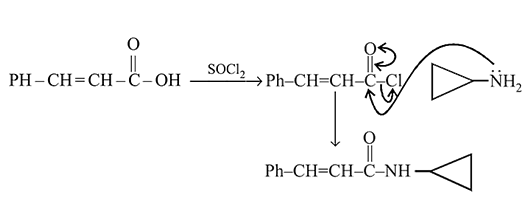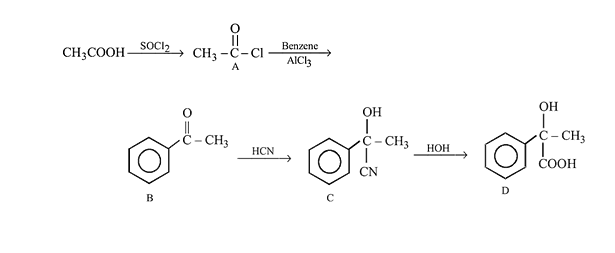Test: Reactions Involving Acid Group - JEE MCQ
Test Description
20 Questions MCQ Test - Test: Reactions Involving Acid Group
Test: Reactions Involving Acid Group for JEE 2024 is part of JEE preparation. The Test: Reactions Involving Acid Group questions and answers have been prepared
according to the JEE exam syllabus.The Test: Reactions Involving Acid Group MCQs are made for JEE 2024 Exam.
Find important definitions, questions, notes, meanings, examples, exercises, MCQs and online tests for Test: Reactions Involving Acid Group below.
Solutions of Test: Reactions Involving Acid Group questions in English are available as part of our course for JEE & Test: Reactions Involving Acid Group solutions in
Hindi for JEE course.
Download more important topics, notes, lectures and mock test series for JEE Exam by signing up for free. Attempt Test: Reactions Involving Acid Group | 20 questions in 20 minutes | Mock test for JEE preparation | Free important questions MCQ to study for JEE Exam | Download free PDF with solutions
Test: Reactions Involving Acid Group - Question 1
Which one of the following compounds undergoes decarboxylation upon heating ?
Detailed Solution for Test: Reactions Involving Acid Group - Question 1
Test: Reactions Involving Acid Group - Question 2
The correct product of the following sequence of reactions

Detailed Solution for Test: Reactions Involving Acid Group - Question 2
| 1 Crore+ students have signed up on EduRev. Have you? Download the App |
Detailed Solution for Test: Reactions Involving Acid Group - Question 3
Detailed Solution for Test: Reactions Involving Acid Group - Question 4
Test: Reactions Involving Acid Group - Question 5
Hydrolsis of an ester gives a carboxylic acid which on Kolbe's electrolysis yields ethane. The ester is
Detailed Solution for Test: Reactions Involving Acid Group - Question 5
Test: Reactions Involving Acid Group - Question 6
What is the missing reagent in the synthesis shown below


Detailed Solution for Test: Reactions Involving Acid Group - Question 6
Test: Reactions Involving Acid Group - Question 7
The compound that undergoes decarboxylation most readily under mild condition is
Detailed Solution for Test: Reactions Involving Acid Group - Question 7
Test: Reactions Involving Acid Group - Question 8
The most suitable reagent for the conversion of  is
is
 is
is
Detailed Solution for Test: Reactions Involving Acid Group - Question 8
Test: Reactions Involving Acid Group - Question 9
The major product form by the monobromination of phenyl benzoate is
Detailed Solution for Test: Reactions Involving Acid Group - Question 9
Test: Reactions Involving Acid Group - Question 10
Number of compounds that will undergo decarboxylation on heating


Detailed Solution for Test: Reactions Involving Acid Group - Question 10
Test: Reactions Involving Acid Group - Question 11
Number of reactions in which product has one carbon lesser than reactant


Detailed Solution for Test: Reactions Involving Acid Group - Question 11
Test: Reactions Involving Acid Group - Question 12
Which of the following compound would be expected to decarboxylates when heated
Detailed Solution for Test: Reactions Involving Acid Group - Question 12
Test: Reactions Involving Acid Group - Question 13
Which of the following does not undergo Hell - Volhard Zelinsky reaction?
Detailed Solution for Test: Reactions Involving Acid Group - Question 13
Test: Reactions Involving Acid Group - Question 14
Which of the following dicarboxylic acids gives a cyclic.anhvdride on heating?
Detailed Solution for Test: Reactions Involving Acid Group - Question 14
Detailed Solution for Test: Reactions Involving Acid Group - Question 15
Test: Reactions Involving Acid Group - Question 16
In a set of reactions, acetic acid yielded a product D.

The structure of (D) would be
Detailed Solution for Test: Reactions Involving Acid Group - Question 16
Test: Reactions Involving Acid Group - Question 17
Which lactone is formed by heating the following hydroxy acid?


Detailed Solution for Test: Reactions Involving Acid Group - Question 17
Detailed Solution for Test: Reactions Involving Acid Group - Question 18
Test: Reactions Involving Acid Group - Question 19
When acetic acid reacts with ketene, product formed
Detailed Solution for Test: Reactions Involving Acid Group - Question 19
Test: Reactions Involving Acid Group - Question 20
The compound, which evolves carbon dioxide on treatment with aqueous solution of sodium bicarbonate at  is
is
 is
is
Detailed Solution for Test: Reactions Involving Acid Group - Question 20
Information about Test: Reactions Involving Acid Group Page
In this test you can find the Exam questions for Test: Reactions Involving Acid Group solved & explained in the simplest way possible.
Besides giving Questions and answers for Test: Reactions Involving Acid Group, EduRev gives you an ample number of Online tests for practice
Download as PDF


 - Keto acids are decarboxylated by following mechanism
- Keto acids are decarboxylated by following mechanism




 in the above reactions is
in the above reactions is
 , hence the ester must be ethanoate
, hence the ester must be ethanoate  .
.
 -Ketoacids undergo decarboxylation easily.
-Ketoacids undergo decarboxylation easily. it is abbreviated as
it is abbreviated as  and is called Collin's reagent. This reagent is used in non aqueous solvent like
and is called Collin's reagent. This reagent is used in non aqueous solvent like  It is a very good reagent because it checks the further oxidation of aldehyde to carboxylic acid while rest oxidising agent oxidise aldehyde into carboxylic acid.
It is a very good reagent because it checks the further oxidation of aldehyde to carboxylic acid while rest oxidising agent oxidise aldehyde into carboxylic acid. the
the  ring gets deactivated, while
ring gets deactivated, while  ring gets activated due to lone pairs on oxygen atom. So it can give ortho or para bromo product. But the ortho position is sterically hindered, so it will give para compound as a major product.
ring gets activated due to lone pairs on oxygen atom. So it can give ortho or para bromo product. But the ortho position is sterically hindered, so it will give para compound as a major product.
 atom
atom are unstable. Only option 2 is stable.
are unstable. Only option 2 is stable.



 gives
gives is a dehydrating agent and removes a molecule of water from two molecules of acetic acid
is a dehydrating agent and removes a molecule of water from two molecules of acetic acid
 acetic anhydride
acetic anhydride



 (Ketene)
(Ketene) hydrolyses to form
hydrolyses to form 
 which subsequently reacts with
which subsequently reacts with  (sodium bicarbonate) present in the same medium to form carbon dioxide
(sodium bicarbonate) present in the same medium to form carbon dioxide  .
.















